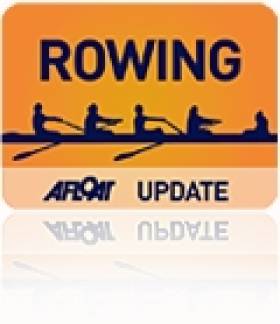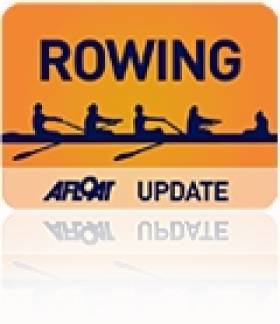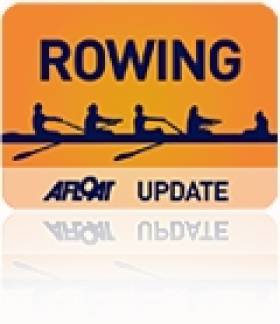Displaying items by tag: Carmody
O'Malley Takes Junior Title at Irish Rowing Championships
ROWING: David O’Malley won the junior single sculls title at the Irish Rowing Championships at the National Rowing Centre today. The St Michael’s man carved out an early lead over last year’s champion Conor Carmoday of Shannon and stretched it to two and a half lengths by half way. Carmody, under pressure himself from Waterford’s Andrew Goff, cut the lead in the closing stages, but O’Malley held on.
The men’s senior doubles was won impressively by Gary O’Donovan and Shane O’Donovan of Skibbereen from Eimantas Grigalius and Dave Neale of Three Castles, while NUIG/Cork won the women’s senior four. The women’s junior doubles was won by Oisin and Dervla Forde, who live in Torrevieja in Spain, but were campaigning for Cork Boat Club.
Irish Rowing Championships, National Rowing Centre, Cork (Selected Results, Finals)
Men
Four, coxed – Intermediate: 1 NUIG 6:26.37, 2 Carlow 6:29.33, 3 Neptune 6:36.71.
Sculling, Quadruple – Novice, coxed: 1 Queen’s 6:49.52, 2 Clonmel 7:01.83, 3 Kenmare 7:17.56.
Double – Senior: 1 Skibbereen 6:30.22, 2 Three Castles 6:34.96, 3 UCC 6:45.32.
Single – Junior: 1 St Michael’s (D O’Malley), 2 Shannon (C Carmody), 3 Waterford (A Goff).
Women
Four – Senior: 1 NUIG/Cork 6:57.92, 2 Trinity 7:09.18, 3 Skibbereen 7:16.93.
Four, coxed – Club: 1 NUIG A 7:25.50, 2 UCC 7:33.87, 3 Skibbereen 7:38.30.
Pair – Intermediate: 1 St Michael’s 7:49.72, 2 Trinity 7:53.27, 3 Shannon 7:53.29.
Sculling
Double – Junior: 1 Cork 7:26.87, 2 Belfast 7:32.25, 3 Commercial 7:36.33.
#ROWING: Ireland’s Eimear Lambe and Jasmine English came within .07 of a second of an A Final placing at the European Junior Rowing Championships in Hazewinkel in Belgium today. The Russia double scull edged out the Irish. Lambe and English later placed sixth in the B Final.
Conor Carmody and David O’Malley won the C Final of the men’s double sculls, placing them 13th overall. They had earlier won their semi-final.
The Ireland junior pair and women’s single competed in C Finals, but were not contenders.Both finished fourth of four crews.
European Junior Rowing Championships, Hazewinkel, Belgium (Irish interest):
Saturday
Men
Pair – Heat Two (First Two Directly to A/B Semi-Finals: 5 Ireland (D Keohane, B Keohane) 7:30.39. Repechage: 5 Ireland 7:34.21
Double Sculls – Heat Three (First directly to A/B semi-finals): 4 Ireland (C Carmody, D O’Malley) 6:56.91. Repechage: 4 Ireland.
Women
Double Sculls – Heat One (First Two Directly to A/B Semi-Finals): 2 Ireland (J English, E Lambe) 7:54.10.
Single Sculls – Heat Three (First Two directly to A/B Semi-finals): 5 Ireland (E Barry) 8:38.33. Repechage: 5 Barry 9:05.20.
Sunday
Men
Pair – C Final (13 to 16): 4 Ireland.
Double – C/D Semi-Final Two: 1 Ireland. C Final:
Women
Double – A/B Semi-Final Two (First Three to A Final): 1 Netherlands 7:19.32, 2 Lithuania 7:24.83, 3 Russia 7:25.57, 4 Ireland 7:24.64. B Final (Places 7 to 12): 6 Ireland.
Single – C Final (13 to 16): 4 Ireland.
Ireland Rowing Crews Find Going Tough in Repechages
#ROWING: The repechage route did not prove a fruitful one for Ireland crews at the European Junior Rowing Championships in Hazewinkel in Belgium. The men’s double of Conor Carmody and David O’Malley were competitve until halfway, but they needed to finish in the top two and missed out by finishing fourth. They will go on to a C/D semi-final tomorrow. The men’s pair of David and Brian Keohane and single sculler Erin Barry both finished fifth. They go directly to their C Finals.
European Junior Rowing Championships, Hazewinkel, Belgium (Irish interest):
Men
Pair – Heat Two (First Two Directly to A/B Semi-Finals: 5 Ireland (D Keohane, B Keohane) 7:30.39. Repechage: 5 Ireland 7:34.21
Double Sculls – Heat Three (First directly to A/B semi-finals): 4 Ireland (C Carmody, D O’Malley) 6:56.91. Repechage: 4 Ireland.
Women
Double Sculls – Heat One (First Two Directly to A/B Semi-Finals): 2 Ireland (J English, E Lambe) 7:54.10.
Single Sculls – Heat Three (First Two directly to A/B Semi-finals): 5 Ireland (E Barry) 8:38.33. Repechage: 5 Barry 9:05.20.































































